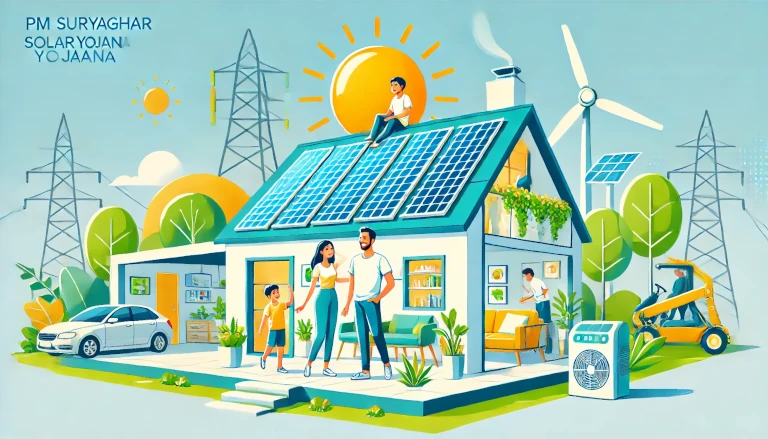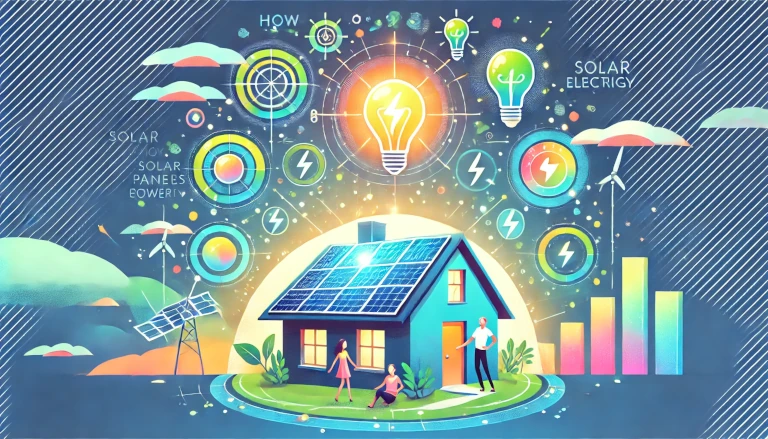Solar energy is rapidly gaining popularity in India as a sustainable and cost-effective way to power homes and businesses. With abundant sunlight and government incentives, many Indians are considering solar power as an alternative to conventional energy sources. This article answers the top 10 frequently asked questions about solar energy in India, covering everything from costs and benefits to installation and maintenance. Whether you’re looking to save on electricity bills or contribute to a greener future, solar power might be the solution you’re seeking.
1. How Does Solar Energy Work ?
In India, solar energy works by using photovoltaic (PV) cells in solar panels to convert sunlight into electricity. Due to India’s abundant sunlight, solar panels are highly effective here. Panels are usually installed on rooftops, ground mounts, or in solar parks to maximize exposure to sunlight, especially given India’s sunny climate.
2. What Are the Benefits of Using Solar Energy ?
Solar energy provides clean, renewable power, helping reduce India’s dependence on fossil fuels and lower greenhouse gas emissions. It can significantly reduce electricity bills and is supported by government incentives. Solar systems can improve energy access in rural areas, are low-maintenance, and have a lifespan of over 25 years, making them a long-term investment.
3. How Much Do Solar Panels Cost ?
The cost of solar panels varies depending on system size, location, and installation requirements. Typically, residential systems range from ₹60,000 to ₹2,00,000 per kilowatt. However, incentives like the Pradhan Mantri Kisan Urja Suraksha evam Utthaan Mahabhiyan (PM-KUSUM) scheme and state-specific subsidies can reduce these costs, making solar affordable for more people.
4. Can Solar Panels Work During Cloudy Days or at Night ?
Solar panels produce less electricity on cloudy days and none at night. However, solar systems can store excess energy in batteries, which can be particularly useful in areas with frequent power outages. Grid-tied systems allow users to draw power from the grid when solar output is low, ensuring continuous electricity supply.
5. How Long Do Solar Panels Last in Indian Conditions?
Solar panels typically last 25-30 years. India’s diverse weather conditions, including high temperatures, might cause slight efficiency reductions over time, but panels are built to withstand such climates. Most manufacturers offer warranties of 20-25 years, and systems continue producing electricity at reduced efficiency after this period.
6. Is My Home or Business Suitable for Solar Panels ?
Solar panels are most effective on south-facing rooftops with minimal shading. In densely populated urban areas, rooftops might have some shade, so a professional assessment is recommended. For rural areas with ample land, ground-mounted systems are also an option. Solar installers can evaluate the location to determine the best solution.
7. How Do I Maintain Solar Panels ?
Maintenance for solar panels in India is minimal and generally involves cleaning to remove dust and debris, which can accumulate quickly in some regions. Regular cleaning, especially in areas prone to dust storms, helps maintain efficiency. Additionally, monitoring systems are available to detect performance issues, ensuring the system operates optimally.
8. Will Solar Panels Increase My Property’s Value ?
Solar panels can enhance property value by reducing energy costs and adding eco-friendly features. With growing awareness of climate change, many buyers in India view solar systems as valuable. Studies indicate that properties with solar installations tend to attract higher prices and sell more quickly than those without solar.
9. Are There Any Government Incentives for Solar Energy ?
India offers several incentives for solar energy adoption, including subsidies under the PM-KUSUM scheme, which supports agricultural solar projects. Other incentives include capital subsidies, tax breaks, and net metering policies, allowing users to earn credit for excess power generated. State-specific schemes may also provide additional benefits.
10. How Do I Choose a Solar Installer ?
When selecting a solar installer, ensure they have MNRE (Ministry of New and Renewable Energy) accreditation and experience with Indian conditions. Obtain multiple quotes to compare costs, warranties, and financing options. Reputable installers will provide a comprehensive proposal covering costs, potential savings, and expected performance, enabling you to make an informed decision.
Discover more from Green Ecosystem - Renewable Energy, Agriculture, and Environmental Sustainability
Subscribe to get the latest posts sent to your email.


